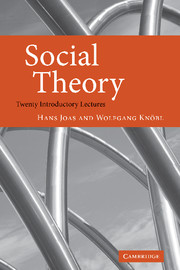Book contents
- Frontmatter
- Dedication
- Contents
- Introduction
- I What is theory?
- II The classical attempt at synthesis: Talcott Parsons
- III Parsons on the road to normativist functionalism
- IV Parsons and the elaboration of normativist functionalism
- V Neo-utilitarianism
- VI Interpretive approaches (1): symbolic interactionism
- VII Interpretive approaches (2): ethnomethodology
- VIII Conflict sociology and conflict theory
- IX Habermas and critical theory
- X Habermas' ‘theory of communicative action’
- XI Niklas Luhmann's radicalization of functionalism
- XII Anthony Giddens' theory of structuration and the new British sociology of power
- XIII The renewal of Parsonianism and modernization theory
- XIV Structuralism and poststructuralism
- XV Between structuralism and theory of practice: The cultural sociology of Pierre Bourdieu
- XVI French anti-structuralists (Cornelius Castoriadis, Alain Touraine and Paul Ricoeur)
- XVII Feminist social theories
- XVIII A crisis of modernity? New diagnoses (Ulrich Beck, Zygmunt Bauman, Robert Bellah, and the debate between liberals and communitarians)
- XIX Neo-pragmatism
- XX How things stand
- References
- Author index
- Subject index
XII - Anthony Giddens' theory of structuration and the new British sociology of power
Published online by Cambridge University Press: 05 June 2014
- Frontmatter
- Dedication
- Contents
- Introduction
- I What is theory?
- II The classical attempt at synthesis: Talcott Parsons
- III Parsons on the road to normativist functionalism
- IV Parsons and the elaboration of normativist functionalism
- V Neo-utilitarianism
- VI Interpretive approaches (1): symbolic interactionism
- VII Interpretive approaches (2): ethnomethodology
- VIII Conflict sociology and conflict theory
- IX Habermas and critical theory
- X Habermas' ‘theory of communicative action’
- XI Niklas Luhmann's radicalization of functionalism
- XII Anthony Giddens' theory of structuration and the new British sociology of power
- XIII The renewal of Parsonianism and modernization theory
- XIV Structuralism and poststructuralism
- XV Between structuralism and theory of practice: The cultural sociology of Pierre Bourdieu
- XVI French anti-structuralists (Cornelius Castoriadis, Alain Touraine and Paul Ricoeur)
- XVII Feminist social theories
- XVIII A crisis of modernity? New diagnoses (Ulrich Beck, Zygmunt Bauman, Robert Bellah, and the debate between liberals and communitarians)
- XIX Neo-pragmatism
- XX How things stand
- References
- Author index
- Subject index
Summary
While it was essential to examine the biographies of the two German ‘grand theorists’ considered in the previous lectures in a fair degree of detail, in order to bring out the ideas central to their theories, this is not necessarily the case with respect to Anthony Giddens. It is quite possible to explain Giddens' attempt at synthesis in light of the trends emerging from the 1960s, particularly within British sociology, without digressing into his personal history. The key here is conflict theory, which we examined in Lecture VIII; two developments in particular were to play an important role for Giddens.
British conflict theory in the 1950s and early 1960s had been closely associated with the names of John Rex and David Lockwood, who – in contrast to the significantly more radical Ralf Dahrendorf – had never broken entirely with the theoretical approach of Parsons, but merely wished to see conflict theory established alongside Parsonian functionalism on an equal footing. Mere ‘co-existence’, however, could never entirely satisfy even the protagonists of conflict theory, and at least the theoretically ambitious Lockwood clearly attempted to break up the rigid opposition between power and conflict theoretical approaches on the one hand and functionalist (as well as interpretive) approaches on the other. In other words, he tried to produce a kind of synthesis. Groundwork had thus been completed that helped pave the way for the later attempts at ‘grand’ synthesis – those of Habermas, Luhmann and Giddens himself.
- Type
- Chapter
- Information
- Social TheoryTwenty Introductory Lectures, pp. 281 - 307Publisher: Cambridge University PressPrint publication year: 2009



